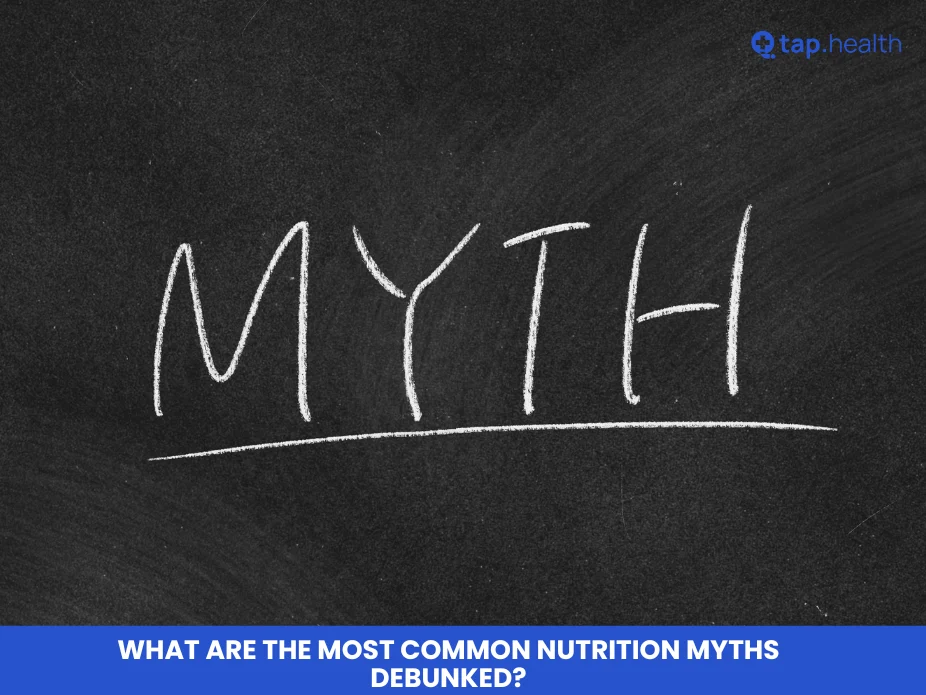In the vast world of nutrition, misinformation can easily spread, leading to confusion and unhealthy eating habits. Understanding the truth behind common nutrition myths is essential for making informed dietary choices that promote overall health and well-being. This article delves into the most prevalent nutrition myths, providing clear, evidence-based explanations to help you navigate your nutritional journey confidently.
Common Nutrition Myths
Myth 1: Carbohydrates Make You Gain Weight
Reality: Carbohydrates are a primary energy source for the body. Weight gain occurs when there is an excess of calories consumed, regardless of the source. Choosing complex carbohydrates like whole grains, fruits, and vegetables can support sustained energy levels and overall health.
Myth 2: High-Protein Diets Are the Best for Weight Loss
Reality: While protein is essential for muscle maintenance and can promote satiety, excessive protein intake may not lead to additional weight loss benefits and can strain the kidneys. A balanced diet that includes proteins, fats, and carbohydrates is more effective for sustainable weight loss.
Myth 3: Eating Fat Makes You Fat
Reality: Dietary fats are crucial for various bodily functions, including hormone production and nutrient absorption. The key is to consume healthy fats, such as those found in avocados, nuts, and olive oil, while limiting trans and saturated fats.
Myth 4: Skipping Breakfast Helps You Lose Weight
Reality: Skipping breakfast can lead to increased hunger and overeating later in the day. A balanced breakfast can kickstart your metabolism and provide essential nutrients to maintain energy levels throughout the morning.
Myth 5: Detox Diets Cleanse Your Body
Reality: The body has its own efficient detoxification systems, primarily the liver and kidneys. Detox diets often lack essential nutrients and can be harmful if followed long-term. A balanced diet rich in fruits, vegetables, and whole grains supports the body’s natural detox processes.
Myth 6: All Calories Are Equal
Reality: While calorie count is important for weight management, the source of calories matters. Nutrient-dense foods provide vitamins, minerals, and other essential nutrients, whereas empty calories from sugary snacks and processed foods do not support overall health.
Myth 7: You Need Supplements to Be Healthy
Reality: A well-balanced diet typically provides all the necessary nutrients. Supplements can be beneficial in cases of specific deficiencies but are not a substitute for healthy eating. It’s essential to consult with a healthcare professional before starting any supplement regimen.
Myth 8: Organic Foods Are Always Healthier
Reality: Organic foods are grown without synthetic pesticides and fertilizers, which can be beneficial for the environment. However, they are not necessarily more nutritious than conventionally grown foods. Both organic and non-organic foods can be part of a healthy diet.
Myth 9: Gluten-Free Diets Are Healthier for Everyone
Reality: Gluten-free diets are essential for individuals with celiac disease or gluten sensitivity. However, for those without these conditions, there is no significant health benefit, and gluten-free products can sometimes be less nutritious.
Myth 10: Eating Late at Night Causes Weight Gain
Reality: Weight gain is influenced by overall calorie intake and expenditure, not the timing of meals. Eating late at night can lead to weight gain if it results in consuming excess calories, but the act of eating late itself is not the direct cause.
Real-Life Scenarios
Scenario 1: Sarah’s Struggle with Low-Carb Diets
Sarah, a 28-year-old marketing professional, decided to adopt a low-carb diet to lose weight quickly. Despite initial weight loss, she experienced fatigue and decreased concentration at work. After consulting a nutritionist, Sarah learned that her body needed a balanced intake of carbohydrates for energy. She adjusted her diet to include complex carbs like quinoa and sweet potatoes, resulting in improved energy levels and sustained weight loss.
Scenario 2: John’s Experience with High-Protein Supplements
John, a 35-year-old fitness enthusiast, believed that consuming high-protein supplements would enhance his muscle growth. However, he noticed kidney discomfort after prolonged use. A healthcare provider advised him to reduce supplement intake and focus on obtaining protein from natural sources like lean meats, beans, and legumes, which alleviated his symptoms and supported his fitness goals more effectively.
Scenario 3: Emily’s Misconception About Detox Diets
Emily, a 40-year-old teacher, embarked on a detox diet to “cleanse” her body. She followed a strict juice-only regimen for two weeks, leading to nutrient deficiencies and decreased energy levels. After researching and consulting with a dietitian, Emily incorporated a variety of whole foods into her diet, supporting her body’s natural detoxification processes without compromising her health.
These scenarios highlight the importance of understanding nutrition myths and making informed dietary choices based on accurate information.
Expert Contributions
Dr. Michael Lee, Nutritionist
Dr. Michael Lee emphasizes, “Nutrition myths can hinder people from achieving optimal health. It’s crucial to rely on evidence-based information and consult with healthcare professionals before making significant dietary changes. Understanding the science behind nutrition helps in making informed and sustainable choices.”
Dr. Amanda Smith, Registered Dietitian
Dr. Amanda Smith adds, “Many nutrition myths persist due to misinformation and marketing tactics. Educating the public about the realities of nutrition empowers individuals to adopt healthier eating habits. A balanced diet tailored to individual needs is more effective than following fad diets based on myths.”
Recommendations Grounded in Proven Research and Facts
Based on extensive research and expert insights, here are some evidence-based recommendations to navigate nutrition effectively:
- Prioritize Whole Foods: Focus on consuming a variety of whole foods, including fruits, vegetables, whole grains, lean proteins, and healthy fats. These provide essential nutrients for overall health.
- Balance Macronutrients: Ensure a balanced intake of carbohydrates, proteins, and fats to support bodily functions and energy levels.
- Stay Hydrated: Adequate water intake is vital for digestion, nutrient absorption, and maintaining energy levels.
- Limit Processed Foods: Reduce consumption of processed and sugary foods, which can contribute to weight gain and other health issues.
- Listen to Your Body: Pay attention to hunger and fullness cues to maintain a healthy relationship with food.
- Consult Professionals: Seek advice from healthcare providers or registered dietitians before making significant dietary changes or starting supplements.
- Educate Yourself: Stay informed about nutrition through reputable sources to make knowledgeable dietary choices.
- Practice Moderation: Avoid extreme diets and focus on moderation to maintain long-term health and well-being.
Factual and Reliable Information
Ensuring the accuracy and reliability of nutritional information is paramount for making informed health decisions. The following guidelines help maintain factual integrity:
- Verify Sources: Use reputable sources such as peer-reviewed journals, established health organizations, and certified professionals for nutrition information.
- Understand the Science: Recognize that nutrition science is complex and evolving. Stay updated with the latest research to differentiate between facts and myths.
- Beware of Fads: Be cautious of fad diets and miracle supplements that promise quick fixes. Sustainable health results from consistent, evidence-based practices.
- Critical Thinking: Apply critical thinking when encountering nutrition claims. Assess the validity of the information before accepting it as truth.
Conclusion
Navigating the world of nutrition can be challenging with the abundance of myths and misinformation. By debunking common nutrition myths and relying on evidence-based information, you can make informed dietary choices that promote health and well-being. Embrace a balanced diet, prioritize whole foods, and consult with healthcare professionals to tailor your nutrition plan to your individual needs. Remember, sustainable health comes from understanding and applying accurate nutritional knowledge.
FAQs on What Are the Most Common Nutrition Myths Debunked?
1. Are all carbohydrates bad for weight loss?
No, not all carbohydrates are bad. Complex carbohydrates like whole grains, vegetables, and fruits provide essential nutrients and sustained energy, supporting overall health and weight management.
2. Can I lose weight without counting calories?
Yes, focusing on nutrient-dense foods, portion control, and balanced meals can help with weight loss without the need for strict calorie counting.
3. Do I need to take vitamin supplements daily?
Not necessarily. A balanced diet typically provides all the necessary vitamins and minerals. Supplements may be beneficial in cases of specific deficiencies, but it’s best to consult with a healthcare provider before starting any supplement regimen.
4. Is organic food always safer to eat?
Organic foods are grown without synthetic pesticides and fertilizers, which can be better for the environment. However, they are not inherently safer or more nutritious than conventionally grown foods.
5. Does eating fat increase cholesterol levels?
Consuming healthy fats, such as those from avocados, nuts, and olive oil, can improve cholesterol levels. However, trans fats and excessive saturated fats can negatively impact cholesterol and should be limited.
6. Can I eat as much as I want if I exercise regularly?
While regular exercise is beneficial, consuming excessive calories can still lead to weight gain. It’s important to maintain a balanced diet to support your activity levels and overall health.
7. Is it necessary to follow a strict diet plan to eat healthily?
No, a strict diet plan is not necessary. Focusing on balanced, varied, and nutrient-dense foods can help you eat healthily without the need for rigid restrictions.
8. Do all calories have the same effect on the body?
No, the source of calories matters. Nutrient-dense foods provide essential vitamins and minerals, while empty calories from sugary and processed foods do not support overall health.
9. Can I rely on weight loss supplements for quick results?
Weight loss supplements are not a substitute for a healthy diet and exercise. They can have side effects and should only be used under the guidance of a healthcare professional.
10. Does eating late at night cause weight gain?
Weight gain is primarily influenced by overall calorie intake and expenditure, not the timing of meals. Eating late can contribute to weight gain if it leads to consuming excess calories.
References
- Harvard T.H. Chan School of Public Health – Carbohydrates
- Mayo Clinic – High-Protein Diet
- National Institute of Diabetes and Digestive and Kidney Diseases – Detox Diets
- Harvard Health Publishing – Calories and Quality
- Harvard T.H. Chan School of Public Health – Organic Foods
- Mayo Clinic – Gluten-Free Diet




